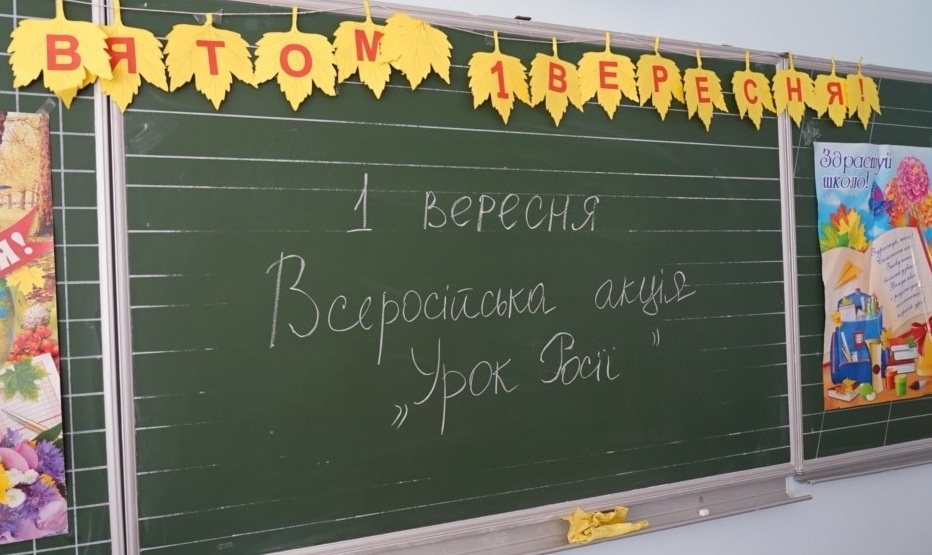The Russification of Culture in Crimea
A traditionally multicultural land, the peninsula seized by Moscow from Kiev in 2014 is now seeing everything that is not Russian systematically targeted. Although even the Moscow-linked authorities recognise three ‘state languages’ on paper - Russian, Ukrainian and Crimean Tatar - education in native languages has almost completely disappeared from schools.
Moscow (AsiaNews) - Russia's strategy in the occupied and annexed territories of Ukraine is to eliminate Ukrainian language and culture as much as possible, in a process of Russification and assimilation of local citizens. This aim is particularly evident in Crimea, which has been part of Russia since 2014. It is a land historically closely linked to Russia, but at the same time traditionally multicultural, and which also maintains strong ties with Ukraine itself.
This was discussed on Radio Krym.Realii by Andrej Šekun, representative of the Kraevaja Rada of Crimean Ukrainians in exile, and Oleg Okhredko, expert at the Almenda Civil Education Centre, who participated in the drafting of a dossier on discrimination against Ukrainians in Crimea. In their opinion, “the occupation of the peninsula has led to a systematic violation of international law and human rights”. The Russians have almost completely banned groups of different nationalities from receiving education in their native language, something that was permitted under the Kiev government, despite the fact that the Russian authorities officially recognise three “state languages”: Russian, Ukrainian and Crimean Tatar.
Šekun recalls that before the annexation, the spread of the Ukrainian language in schools was proposed without imposition and with gradual introduction, with a programme defined by the 2005 Ukrainian constitution, which established the introduction of “external and independent assessment” in language matters. All 600 schools in Crimea were guaranteed Ukrainian language and literature teachers, which were not provided for in Soviet times, despite the peninsula being part of the socialist republic of Kiev. In 2014, before the “Maidan revolution”, only seven of these schools had Ukrainian as the sole language of instruction for all subjects, while the others had separate classes for different language groups.
Since the Russian annexation, however, a campaign has been launched at all levels to “destroy everything Ukrainian”, says Šekun, not only education, but also culture, religion and the media. The seven exclusively Ukrainian schools no longer exist, and in the others, teaching in Ukrainian has remained only optional. In fact, it has been eliminated, partly due to a lack of teachers and textbooks for Ukrainian language and literature. A similar situation can be found in the regions of Kherson, Zaporizhia, Donetsk and Luhansk. Furthermore, since the Ukrainian government did not have a sufficiently developed humanitarian policy in Crimea before 2014, the Russians have imposed a narrative that “war is necessary where state support fails”.
Okhredko also confirms that since 2014 “teacher training has been reduced to nothing” and all schools have been organised according to Russian standards, effectively excluding subjects related to various nationalities, starting with Ukrainian. The situation has worsened since the start of the open war in 2022, with “Ukrainian identity becoming the target of persecution using criminal methods”. All assurances and declarations of “respect for minorities” are merely “smoke and mirrors”, and instead of the “genocide of Russians” that allegedly provoked the war, what is actually taking place is the “genocide of the Ukrainian people”.
Not only in schools, but throughout Crimean society, books in Ukrainian are being eliminated, even collected from children's homes and then destroyed in demonstrations by the so-called ‘Movement of the Firsts’, the youth association to which the definition of ‘Putin-Jugend’ applies. Experts are calling for the spread of the idea of a process of ‘de-occupation’ and reintegration of Crimea, regardless of the outcome of the war, with humanitarian actions starting today for Crimean refugees in Ukraine and other countries, otherwise “the consequences of this situation will be felt for a very long time”, even if the territory of Crimea is regained, which is difficult to achieve but must be started today.
07/02/2019 17:28







.png)










